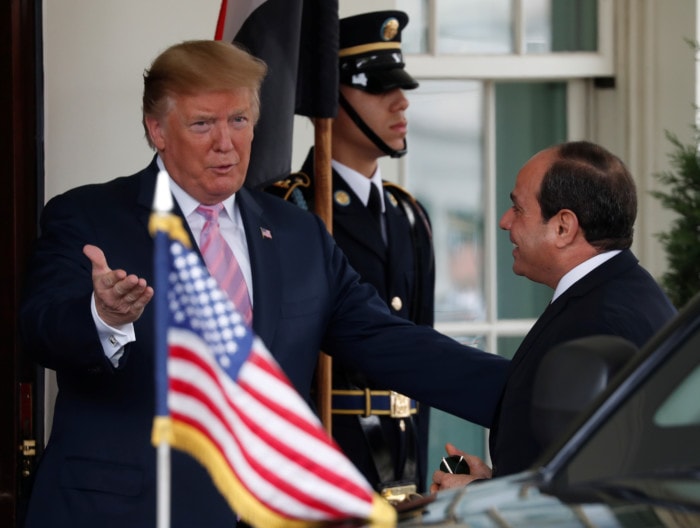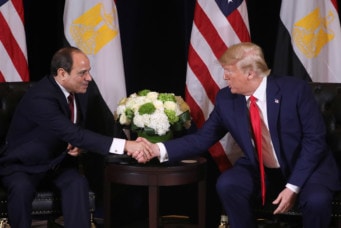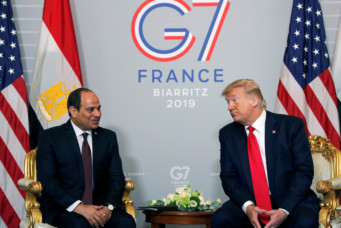Egypt, United States Must Navigate a New Alliance
Strategic priorities in Cairo and Washington have shifted somewhat in recent years leaving what was once a critical relationship out of unison.

Following a strained U.S.-Egypt relationship, relations between Egypt and the United States could see a revival under a Biden administration, Washington, April 9, 2019. Carlos Barria/Reuters
In the period between the late 1970s and the turn of the century, an alignment on strategic issues between Egypt and the United States forged a relationship that became the foundation of a strategic alliance that was once a pivotal force in U.S.-Middle East peace negotiations.
But tectonic changes in the region, including Arab popular uprisings and the rise of extremist non-state actors, have created rifts between the two allies and transformed their relationship into one which is tokenistic and aid-dependent, used to leverage only minor diplomatic initiatives. So why is one of the most important political partnerships showing signs of decay?
“It is a relationship that has grown stale,” said Jon Alterman, senior vice-president of the Center for Strategic and International Studies (CSIS) and director of its Middle East program since 2002. Alterman, Karim Haggag, the director of the Middle East Center at the American University in Cairo (AUC), and political science professor Mohamed Kamal attempted to chart and dissect the century-old U.S.-Egyptian relationship during an online webinar hosted by The Prince AlWaleed Center for American Studies and Research (CASAR) at AUC.
Having originally established diplomatic ties in 1922 following Egypt’s independence from being a protectorate under Great Britain, Egypt and the United States have seen their political relationship go through various peaks and troughs. The most significant diplomatic slump was a seven-year hiatus between 1967 and 1974 triggered by former President Gamal Abdel Nasser’s opposition to U.S. support of Israel’s military; his alliance with the Soviet Union further drove U.S.-Egyptian relations into the ground until Anwar Sadat’s rise to power presented a tangible shift in Egyptian foreign policy regarding the United States.
Sadat’s expansion of U.S,-Egyptian relations in 1974 paved the way for an aid mechanism, whereby the United States provided Egypt with over $50 billion in military assistance and $30 billion in economic assistance over four decades. It is precisely this aspect of the U.S.-Egypt relationship that Alterman finds to be troubling. “The aid relationship has become an encumbrance because it argues that we can keep things the way they are, that we can focus on stability,” he said. It is a one-way street that has stagnated and immobilized the relationship between the two countries for years, he added. However, Haggag, who is also an Egyptian career diplomat, explained that “when push comes to shove” both countries will be there for each other regardless of their differences.
Beyond aid, however, the situation between both countries has been made fraught by a number of factors: Egypt has prioritized the nurturing of its relationships with non-U.S. allies, namely Russia, but particularly China. Similarly, Alterman posits that Egypt no longer occupies centerstage in the United States’ Middle East agenda.
Things Are Not Always As They Seem
Ultimately, the webinar’s three guest speakers agreed on one issue: despite the tension, the U.S.-Egyptian relationship should be carefully maintained. Haggag, who is a visiting fellow of the Harvard Kennedy School’s Middle East Initiative and co-managing editor of the Cairo Review of Global Affairs, pinpoints the durability and sustained health of the relationship despite troubles across the years. Shared security interests in the Eastern Mediterranean and Red Sea regions bind both countries militarily, as well as mutual commitments over regional peace-building and conflict resolution, especially over issues of great sensitivity such as the Palestinian-Israeli conflict. Considering that U.S.-Egyptian relations have been tested in the last decade by two political upheavals in Egypt, repeated criticism in the U.S. about Egypt’s human rights record, and Cairo’s suspicions regarding Washington’s interference in its domestic affairs, Haggag remains steadfast in his belief that both sides understand the significance of their partnership not only to each other, but to the rest of the region as well.
Despite this relationship’s endurance, America’s reduced ambitions in the Middle East cannot be denied. With the rotating door of presidential changes in Washington and political upheavals in the region comes a consensus that Egypt generally matters less to Washington than it did ten years ago, and in that regard, both sides must adjust. Haggag suggested that Egypt has already taken steps toward adjusting to this new reality by initiating significant fora for regional cooperation, investing heavily in Libya, and doing much of the “heavy lifting” on the Palestinian front. On all of these issues, Egypt has sometimes moved in tandem, but has often moved exclusively from the United States.
But since Biden took over, three main interactions have occurred between Egypt and the United States that point to a lasting strategic partnership between the two countries, said professor Kamal, who is also the director of the Institute of Arab Research and Studies. First, the statement accompanying the approval of a $200 million arms sale in February explicitly framed Egypt as a strategic military partner regarding regional issues. Second, a meeting which took place between Kenneth Franklin McKenzie Jr., commander of the United States Central Command, and Egyptian President Abdel Fattah El-Sisi framed Egypt as a strategic partner in combatting terrorism and establishing regional trade opportunities, Kamal explained. Third, a phone call between U.S. Secretary of State Antony Blinken and Egyptian Foreign Minister Sameh Shoukry again highlighted the importance of the strong strategic partnership between both countries, particularly in security and ongoing counterterrorism cooperation.
However, Blinken did raise the Biden Administration’s concerns over human rights, which he said would be significant to renewing the U.S.-Egypt bilateral relationship, as well as Egypt’s bid to buy advanced Su-35 fighter aircraft from Russia.
Business As Usual?
Kamal suggested that the Biden administration is eager to revive its relationship with Egypt and that issues of human rights and democracy will likely be tangential compared to both shared military interests. “This new relationship between the Biden administration and Egypt will not be managed by one institution; there will be a departure from Trump’s approach of White House decision-making centrality,” he added. Biden is likely to rely on the many institutional resources at the United States’ disposal in order to maintain strong relations with Egypt.
Alterman rebutted by emphasizing that “Egypt is no longer the fulcrum of the region”. The United States, while not having as much global or regional influence during the Trump era, still maintains its centrality in global politics. However, it does not always know how to utilize that centrality, according to Alterman.
Even so, a “business as usual” narrative cannot be fully indulged at the current time. The new Biden administration has yet to fully settle down, meaning that much of the United States’ new agenda regarding Egypt, and the Middle East as a whole, has not yet been finalized.
Many questions still abound: will Biden take a new approach to discussing the issue of human rights with Egypt for example? There is reason to believe that the new administration will likely thread a global human rights narrative, whereby they will simultaneously be critical of Egypt, China, and Russia, without heavily considering each case separately. And will Biden approach the U.S.-Egypt relationship with less of a focus on military spending? Washington may look to expand its economic assistance to Egypt while dialing back expenditure on arms in order to counteract the growing trade relationship between Egypt and China.
Much of the new administration’s priorities are still not in place, but with regards to the “business as usual” theory, Alterman believes there should be greater effort and entrepreneurship on both sides to drive the relationship between the two countries past historical convention. “There has to be a serious reckoning for how this relationship can move forward. Both sides have to address the key assumptions upon which the relationship has been built,” Haggag explained.
Looking to the Future
But is frank dialogue enough to drive a new era of U.S.-Egyptian relations? Not if all other variables remain unchanged.
For example, when it comes to the issue of the Grand Ethiopian Renaissance Dam (GERD), Haggag believes that the United States has an opportunity to play a proactive role in resolving the dispute between Egypt, Sudan, and Ethiopia. However, under the Biden administration, the agenda for GERD has not yet been set. Instead, the United States is likely prioritizing a new strategy for Syria. Kamal, echoing Haggag’s comments, believes that the GERD should be central in the future of the U.S.-Egypt dialogue, particularly because internal U.S. lobbying groups, namely the Black Caucus, have shifted their view on the GERD issue in support of the Ethiopian position.
Regarding Egypt’s relationship with China, Alterman explained that if Egypt continues to buy arms from Russia and China, the United States will likely invoke penalties through the Countering America’s Adversaries Through Sanctions Act (CAATSA). Since the United States has done exactly that with Turkey, a NATO ally, it is in the realm of likelihood to expect that it would do the same with Egypt.
In their concluding remarks, all three speakers stressed the importance of the United States’ and Egypt’s strategic and historic partnership. “To fully grasp the future of this relationship, we have to untether it from its own past. A more dynamic U.S.-Egypt relationship will make for a stronger Egypt and a stronger United States,” explained Alterman. Haggag echoed this sentiment with a caveat by explaining that there is a real imperative in renewing the strategic rationale that underpins the relationship, but that fully reimagining the aid dynamic will not be the “silver bullet that saves it”. “Much has changed since the 1970s” added Kamal, “but what remains true is that Egypt still matters to the United States and the United States still matters to Egypt”. However, this relationship, which was once unquestionable, now comes with conditions and reconsiderations.
Mahmoud El Shabba is a reporter-researcher at the Cairo Review of Global Affairs.
Read More



